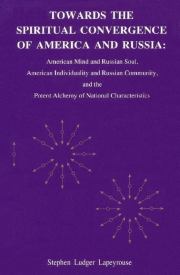Stephen Ludger Lapeyrouse - Towards the Spiritual Convergence of America and Russia: American Mind and Russian Soul, American Individuality and Russian Community, and the Potent Alchemy of National Characteristics
 | Название: | Towards the Spiritual Convergence of America and Russia: American Mind and Russian Soul, American Individuality and Russian Community, and the Potent Alchemy of National Characteristics |
Автор: | Stephen Ludger Lapeyrouse | |
Жанр: | История: прочее, Культурология и этнография, Философия | |
Изадано в серии: | неизвестно | |
Издательство: | Stephen Lapeyrouse | |
Год издания: | 1990 | |
ISBN: | 0-9628048-0-0 | |
Отзывы: | Комментировать | |
Рейтинг: | ||
Поделись книгой с друзьями! Помощь сайту: донат на оплату сервера | ||
Краткое содержание книги "Towards the Spiritual Convergence of America and Russia: American Mind and Russian Soul, American Individuality and Russian Community, and the Potent Alchemy of National Characteristics"
В своей книге «К духовному единению Америки и России» независимый американский ученый, философ и журналист Стивен Лаперуз пытается проследить духовные связи между двумя странами на примере таких близких по духу философских течений, как американский трансцендентализм (Р. Эмерсон, Г. Торо) и русское славянофильство (И. Киреевский, А. Хомяков). «Если мои усилия соответствовали поставленной задаче, я надеюсь, что эта книга поможет осмыслить всю важность и глубину религиозных, философских и психологических связей между народами России и Америки на высшем, «горнем» уровне идей и духовных устремлений. Надеюсь также, что это осмысление поможет думающим и искренним людям в обеих странах обрести ясные, творческие и полезные духовные ориентиры, тем самым содействовать взаимопониманию и духовному общению русских и американцев и по возможности способствовать «алхимическому» слиянию Американского Рассудка и Русской Души, Американской Индивидуальности и Русской Общины. Все это послужит прояснению духовного самосознания и укреплению духовной цельности сыновей и дочерей обеих стран, а значит и всего человечества». – Автор In his book “Towards the Spiritual Convergence of America and Russia” an independent American scholar, philosopher and journalist Stephen Lapeyrouse explores spiritual connections between two countries on the example of such kindred philosophical movements as American Transcendentalism (R. W. Emerson, H. D. Thoreau ) and Russian Slavophilism (I. Kireyevsky, A. Khomyakov). “If my efforts in this work are adequate to the task, I wish to make substantial intellectual contributions towards a clear description of how essential and profound a spiritual, philosophical and psychological relation exists, between characteristic highest (“vertical”) conceptions and aspirations — and tasks — of Mankind in America and Russia. The hope is that such understanding could contribute, essentially, towards a clearer, creative, and mutually-beneficial spiritual orientation — in thoughtful and heartful individuals of both nationalities — which might lead to a more conscious spiritual meeting of “Russian” and “American”; and thereby, possibly, promote an alchemical blending of the American Mind and Russian Soul, American Individuality and Russian Community. Such a greater clarity towards a greater spiritual realization, and more complete wholeness, in some men and women of each country, and thereby, perhaps, in portions of Mankind as a whole.” — the Author
К этой книге применимы такие ключевые слова (теги) как: Russia, America, philosophy, culture, history, American Dream, Russian soul, Slavophilism, Transcendentalism, Emerson, Khomyakov, Kireyevsky, Soloviev
Читаем онлайн "Towards the Spiritual Convergence of America and Russia: American Mind and Russian Soul, American Individuality and Russian Community, and the Potent Alchemy of National Characteristics". [Страница - 48]
If we do not recognize and teach, that the inner beast in man must ultimately be self-trained and tamed, we shall never come into a real lasting control of the wild beasts in man which roams our streets. The call for a renewal of “social values” is inadequate (as well as necessary — conditions being so bad) and superficial. It is based on an inadequate, and even shallow optimism as to the nature of the human being; and it does not go to the heart of the problem. For the problem is with the beast in man. How is he to be controlled? Is he to be governed by some political leader’s call for a renewal of “social values” (the very expression looks at men and women of mankind form the outside, on a mass social scale: it does not address itself to the inner life); or are we to be controlled by fear of our generic “God”, who blesses everything from our dollars to our football games? The beast in men and women of man — (homo sapiens) the allegedly thinking creature, presumably wiser than beasts — must be called to governance by the individual’s own self. This is a morality worthy of that creature which conceives itself distinguished in wisdom from the instinctual animals. We cannot avoid (conditions being what they are) a tremendous call for outer morality, but if we continue to ignore or deemphasize the necessity of an inner morality, we are naive to be surprised and frightened by anything but regular outbreaks of the wild and untamed beasts in men and women of man, out of the inner life, into our society. If “God” must put fear into the souls of our immoral and ungoverned, then we had better find a more intimidating God than the one in whom we currently imagine ourselves to have placed our trust. If man is to be treated as more than a wild animal needing caging; then we must start calling for a renewal of inner morality. This task of taming the inner beast in man is itself a great, arduous responsibility; but it is the core on which all social morality rests. And, in all of our leaders, be they political, social, literary or religious, this task is equally burdensome; for it is inherent in the human being as such. If we would have a renewal of social values in our troubled society and civilization, it must ultimately and essentially transpire inside the heart and soul of each of all of us — from the inner life of our nation’s political leaders, down to the dwellers of our “inner cities”. Ultimately the problem of “values” has to do with morality; and outer moral activity must be based on inner morality: the tamed, self-governed, ennobled beast in man.
(обратно) [221] “No man is an Island, entire of it self; every man is a piece of the Continent, a part of the main.” John Donne, Devotions, Meditation 7: “For Whom the Bell Tolls.” This was cited also by President Gorbachof in his speech to the United Nations.
(обратно) [222] Emerson: “See two sincere men conversing together. They deport themselves as if self-existent. Are they not for the time two Gods? For every true man is as if he should say, I speak for the Universe…” Cited in W.A. Clebsch, American Religious Thought, p. 101, [Emerson: Journals and Miscell. Notebooks:4: 309].
(обратно) [223] Cited in R. J. Wilson, ‘The Plight of the Transcendent Individual”, in In Quest of Community: Social Philosophy in the United States, 1860-1920, p. 13; [See Emerson’s essay “Solitude and Society”].
(обратно) [224] Cited in R. J. Wilson, ‘The Plight of the Transcendent Individual”, in In Quest of Community: Social Philosophy in the United States, 1860-1920; p. 13.
(обратно) [225] From The Pushkin Speech, June 6, 1880. See The Dream of a Queer Fellow, and The Pushkin Speech, translated by S. Koteliansky and J. Middleton Murry, p. 57-58. In The Brothers Karamazov, in the thoughts on love, by “Father Zossima” (Part Two, Book VI, 2) can be found one of the deepest literary renderings, of a superlative “religion of love” (Emerson), as conceived in the Russian Christian world.
(обратно) [226] Ivan Kireyevsky, citation position uncertain.
(обратно) [227] We have considered this question of the striving to achieve “the good life” in the “horizontal”, in America, in relation to the common conception of the American Dream. You might could say that America is distracted from higher “vertical” pursuits by an over-abundance of “material plenty” in the “horizontal”; whereas Russia and the USSR are, understandably fixated here, due to sparsity. Such conditions, alone, would bring about differing developments of individual and collective psychology.
(обратно) [228] See Note 212.
(обратно) [229] From Rudolf Steiner, Lectures on the Apocalypse of St John, lecture of 24 June, 1908, Nürnberg.
(обратно) [230] James Truslow Adams, The Epic of America, p. 380.
(обратно) [231] Citation from Oliver W. Holmes, R. W. Emerson, p. 104 [R.W. Emerson, Complete Works, I, p. 186]
(обратно) [232] Nicholas Berdyaev, “Russia and the Moden World Era”, in The Russian Review, 1948, p. 14
(обратно) [233] In Central Europe, Goethe, for a great example, pointed a way for a higher, inner life for Man.
(обратно) [234] In a real way, one could view such an alchemical blending, in the individual and the community — and in the intellectual-spiritual understanding of both — as a reunion of the differing, severed Evagrian and (Pseudo-?) Macarian conceptions of Man’s relation to Divinity and Deification, i.e. in the Mind and Heart of Man!
(обратно)--">
Книги схожие с «Towards the Spiritual Convergence of America and Russia: American Mind and Russian Soul, American Individuality and Russian Community, and the Potent Alchemy of National Characteristics» по жанру, серии, автору или названию:
 |
| Юрий Андреевич Андреев, Василий Иванович Кузищин, Геннадий Андреевич Кошеленко и др. - История Древней Греции Жанр: История: прочее Год издания: 1996 |
 |
| Вячеслав Владимирович Меньшиков - Ржев – Сталинград. Скрытый гамбит маршала Сталина Жанр: Военная документалистика и аналитика Год издания: 2012 |
 |
| Ольга Игоревна Елисеева - Геополитические проекты Г. А. Потемкина Жанр: История: прочее Год издания: 2000 |



